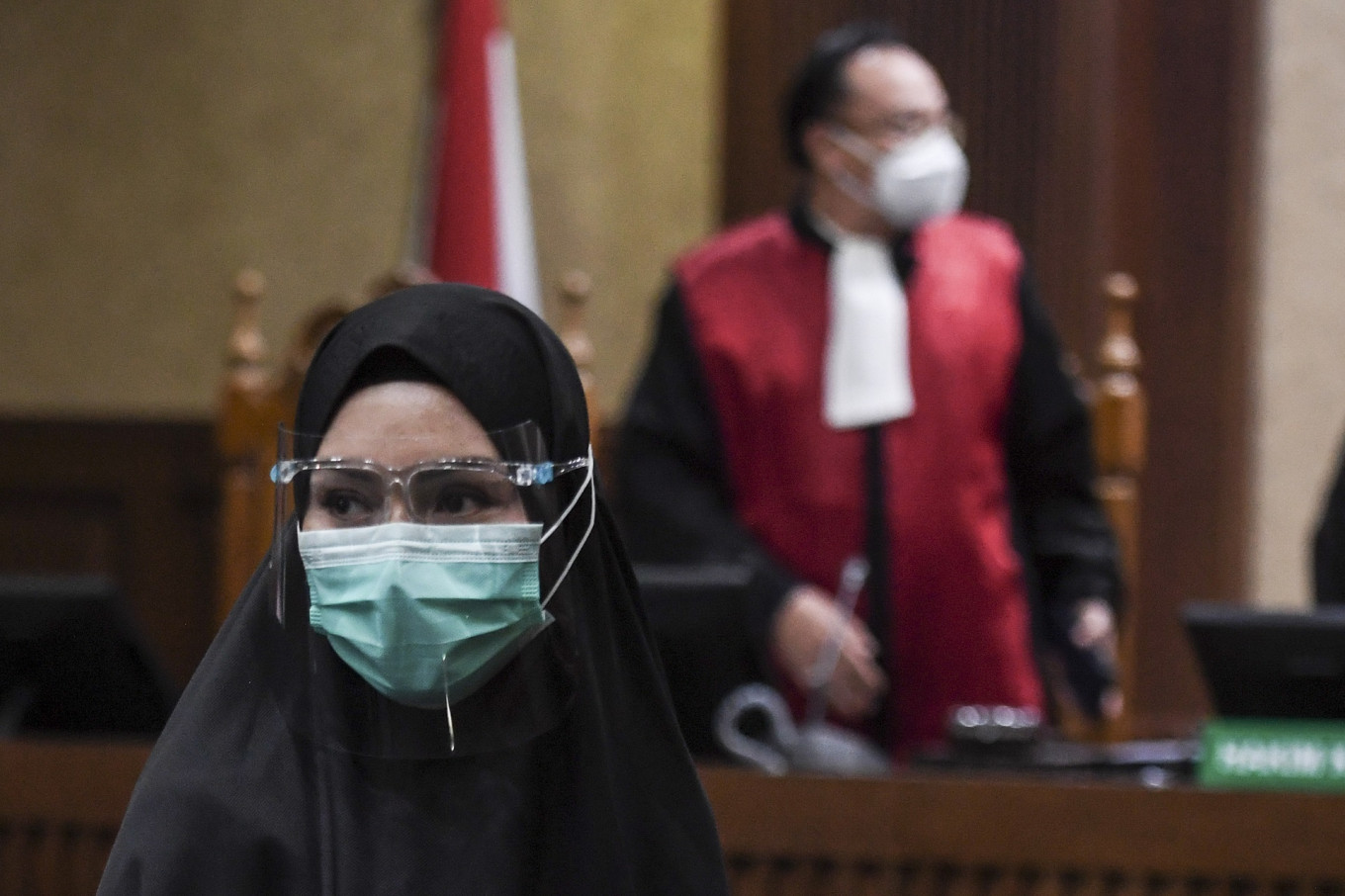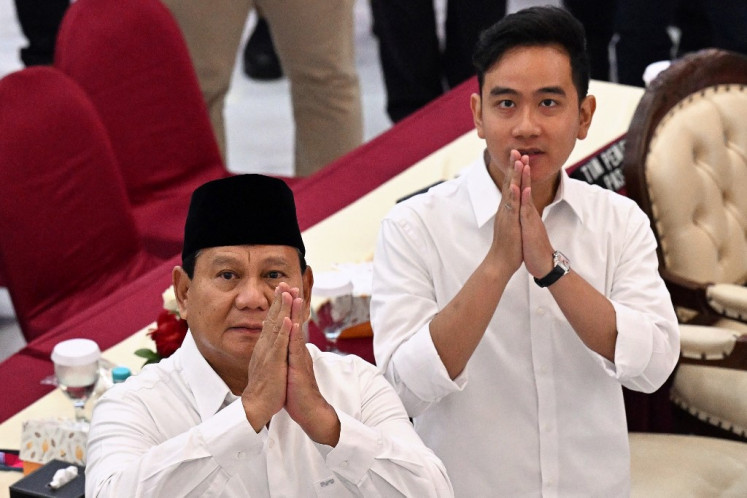Sentence cut in Pinangki case raises leniency concerns
Jakarta High Court judges argued that Pinangki should have her prison sentence cut so she could nurture her child's growth and be treated fairly as a woman.
Change Size

A
recent prison sentence cut given to suspended Attorney General Office’s (AGO) prosecutor and graft convict Pinangki Sirna Malasari has sparked outrage, raising concerns of a significant setback in the country’s antigraft campaign.
On Monday, a panel of judges at the Jakarta High Court ruled to cut Pinangki’s prison sentence to only four years. Additionally, she was ordered to pay a Rp 600 million (US$41,685) fine.
The Jakarta Corruption Court initially sentenced her to 10 years’ imprisonment for accepting US$500,000 in bribes from runaway graft convict Djoko Tjandra in exchange for her help in securing an acquittal from the Supreme Court.
Djoko was sentenced to two years in prison and Rp 546 billion in restitution in 2009 by the Supreme Court for his involvement in the Bank Bali corruption case. But he fled to Papua New Guinea a day before the court issued its ruling.
The police caught him in Malaysia and brought him back to the country last year. The court later found him guilty of bribing Pinangki and other law enforcement officers and sentenced Djoko to four and a half years’ imprisonment.
Among the mitigating factors considered by the high court’s bench in cutting Pinangki’s prison time was the fact that she was a mother to a four-year-old child and “deserves to be given an opportunity to nurture her child’s growth.”
“As a woman, the defendant must get attention, protection and she deserves to be treated fairly,” the judges argued, as written in a copy of the ruling obtained by The Jakarta Post.
Judges added the prosecutors’ initial demand of four years of imprisonment had reflected a “sense of fairness”.
Read also: Prison sentence leaves questions unanswered in Djoko Tjandra case
‘Disparity in future rulings’
Antigraft activists quickly slammed the high court’s ruling, saying the judges had shown a lack of commitment to fighting corruption.
Zaenur Rochman of Gadjah Mada University’s Center for Anticorruption Studies (Pukat UGM) said the judges did not consider aggravating factors in the lower court judges’ verdict, including Pinangki’s position as a law enforcement official.
“She was considered a main perpetrator who orchestrated an attempt to assist a graft fugitive to avoid the law. That’s a significant [criminal act],” Zaenur said on Wednesday.
He added that the mitigating factor as considered by the high court would create “disparities” in future rulings over similar cases. Zaenur highlighted that such a factor was not considered in other corruption cases with female defendants who were also mothers, such as former Democratic Party politician Angelina Sondakh.
The Jakarta Corruption Court sentenced the former beauty queen in 2012 to a four-and-a-half-year prison term after finding her guilty in corruption cases surrounding the Education and Culture Ministry (now the Education, Culture, Research and Technology Ministry) as well as the Youth and Sports Ministry.
Her subsequent appeal to the Jakarta High Court resulted in a heavier sentence of 12 years despite the fact that she had a 3-year-old child at the time. She eventually managed to get her sentence cut to 10 years following a judicial review petition at the Supreme Court in 2015.
Indonesia Corruption Watch (ICW) researcher Kurnia Ramadhana said the ruling “clearly showed a lack of commitment” from the Jakarta High Court in the country’s antigraft campaign.
“The prosecutors should immediately file a petition [with the Supreme Court] to allow Pinangki be given a harsher sentence, while Supreme Court chief justice [Muhammad Syarifuddin] should closely monitor the appeal process,” said Kurnia in a statement.
The assistant attorney general for special crimes, Ali Mukartono, said the Attorney General’s Office (AGO) would study the ruling before deciding whether to file an appeal, as reported by Antara news agency on Wednesday.
Read also: Indonesians believe corruption more rampant this year, survey finds
Worrying trend of leniency in higher courts
Pinangki’s ruling adds to a growing list of cases in which a graft defendant receives a significant sentence cut in the appeal courts.
Among the recent examples is former United Development Party (PPP) chairman Muhammad Romahurmuziy. The Jakarta Corruption Court initially sentenced him to two years for his role in a bribery case at the Religious Affairs Ministry. But the Jakarta High Court cut his prison sentence to one year, allowing him to walk free as he had completed one year in detention.
Former Democratic Party chairman Anas Urbaningrum also had his prison sentence reduced from 14 years to eight years by the Supreme Court. He was found guilty in a corruption case pertaining to the Hambalang sports complex in Bogor, West Java -- a case that also implicated Angelina and other Dems politicians.
Wawan Suyatmiko of Transparency International Indonesia (TII) said Pinangki’s ruling could be considered as a significant setback in the country’s anticorruption fight. Incidentally, it occurred around the same time as the dismissal of dozens of Corruption Eradication Commission (KPK) employees for failing a civic knowledge test.
The antigraft agency came under scrutiny for holding a controversial test as part of the transition process for its employees to become civil servants. According to several employees, the test reportedly contained questions that discriminated against certain races and religious beliefs.
Fifty one employees were dismissed from the KPK because they failed the test and were deemed unfit to receive additional career development support.
Read also: The crisis within a crisis: COVID-19 and corruption
Wawan added the ruling against Pinangki would likely not reflect well on the performance of the country’s judiciary body in delivering just verdicts -- one of many indicators assessed in Transparency International’s annual Corruption Perception Index (CPI) report.
Indonesia’s score in the perception index declined for the first time under President Joko “Jokowi” Widodo’s administration last year, when it scored 37 out of 100. In 2019, the country scored 40.
According to the graft watchdog, several regulations issued by the government for the economy and investment, including those related to COVID-19 mitigation efforts, did not adhere to the value of integrity, thus triggering corruption.









